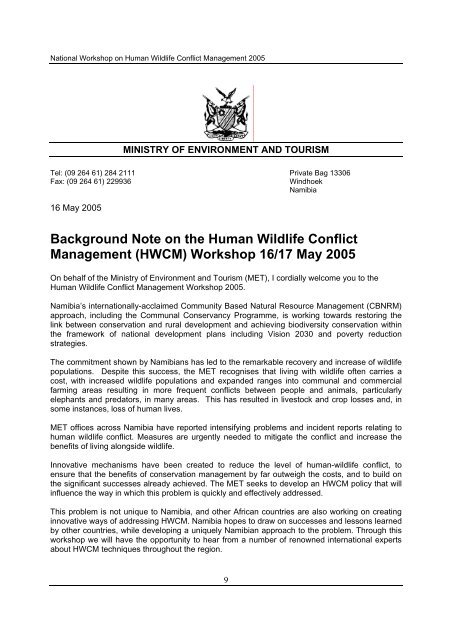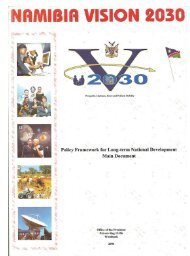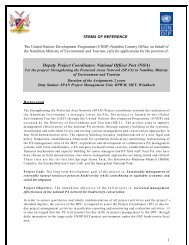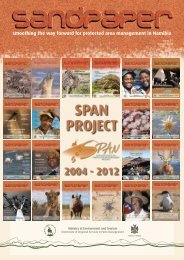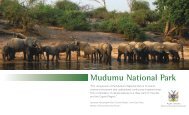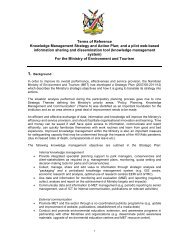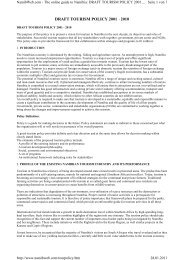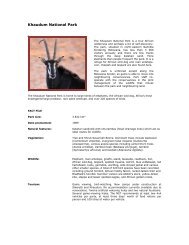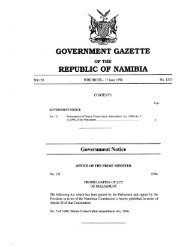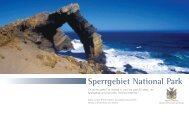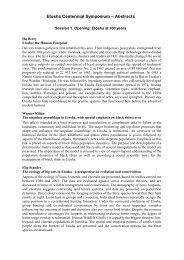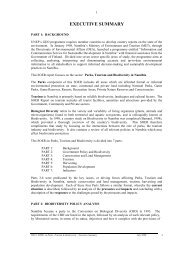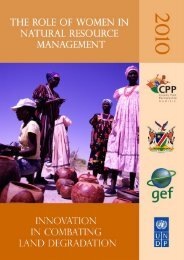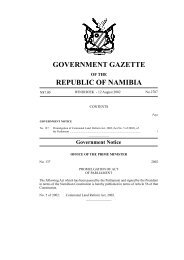HWCM - Ministry of Environment and Tourism
HWCM - Ministry of Environment and Tourism
HWCM - Ministry of Environment and Tourism
Create successful ePaper yourself
Turn your PDF publications into a flip-book with our unique Google optimized e-Paper software.
National Workshop on Human Wildlife Conflict Management 2005<br />
MINISTRY OF ENVIRONMENT AND TOURISM<br />
Tel: (09 264 61) 284 2111 Private Bag 13306<br />
Fax: (09 264 61) 229936<br />
Windhoek<br />
Namibia<br />
16 May 2005<br />
Background Note on the Human Wildlife Conflict<br />
Management (<strong>HWCM</strong>) Workshop 16/17 May 2005<br />
On behalf <strong>of</strong> the <strong>Ministry</strong> <strong>of</strong> <strong>Environment</strong> <strong>and</strong> <strong>Tourism</strong> (MET), I cordially welcome you to the<br />
Human Wildlife Conflict Management Workshop 2005.<br />
Namibia’s internationally-acclaimed Community Based Natural Resource Management (CBNRM)<br />
approach, including the Communal Conservancy Programme, is working towards restoring the<br />
link between conservation <strong>and</strong> rural development <strong>and</strong> achieving biodiversity conservation within<br />
the framework <strong>of</strong> national development plans including Vision 2030 <strong>and</strong> poverty reduction<br />
strategies.<br />
The commitment shown by Namibians has led to the remarkable recovery <strong>and</strong> increase <strong>of</strong> wildlife<br />
populations. Despite this success, the MET recognises that living with wildlife <strong>of</strong>ten carries a<br />
cost, with increased wildlife populations <strong>and</strong> exp<strong>and</strong>ed ranges into communal <strong>and</strong> commercial<br />
farming areas resulting in more frequent conflicts between people <strong>and</strong> animals, particularly<br />
elephants <strong>and</strong> predators, in many areas. This has resulted in livestock <strong>and</strong> crop losses <strong>and</strong>, in<br />
some instances, loss <strong>of</strong> human lives.<br />
MET <strong>of</strong>fices across Namibia have reported intensifying problems <strong>and</strong> incident reports relating to<br />
human wildlife conflict. Measures are urgently needed to mitigate the conflict <strong>and</strong> increase the<br />
benefits <strong>of</strong> living alongside wildlife.<br />
Innovative mechanisms have been created to reduce the level <strong>of</strong> human-wildlife conflict, to<br />
ensure that the benefits <strong>of</strong> conservation management by far outweigh the costs, <strong>and</strong> to build on<br />
the significant successes already achieved. The MET seeks to develop an <strong>HWCM</strong> policy that will<br />
influence the way in which this problem is quickly <strong>and</strong> effectively addressed.<br />
This problem is not unique to Namibia, <strong>and</strong> other African countries are also working on creating<br />
innovative ways <strong>of</strong> addressing <strong>HWCM</strong>. Namibia hopes to draw on successes <strong>and</strong> lessons learned<br />
by other countries, while developing a uniquely Namibian approach to the problem. Through this<br />
workshop we will have the opportunity to hear from a number <strong>of</strong> renowned international experts<br />
about <strong>HWCM</strong> techniques throughout the region.<br />
9


